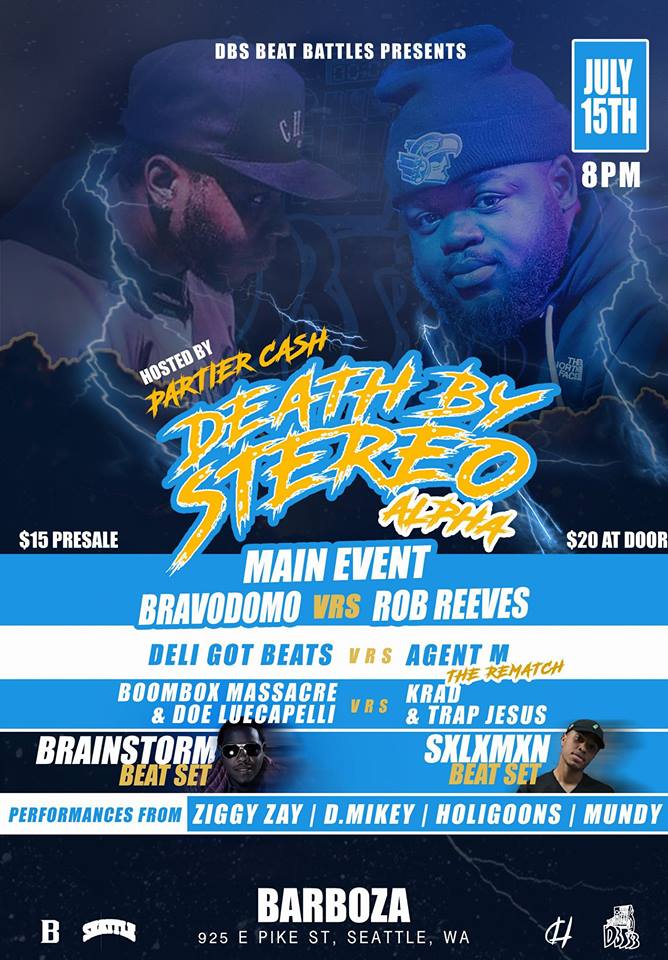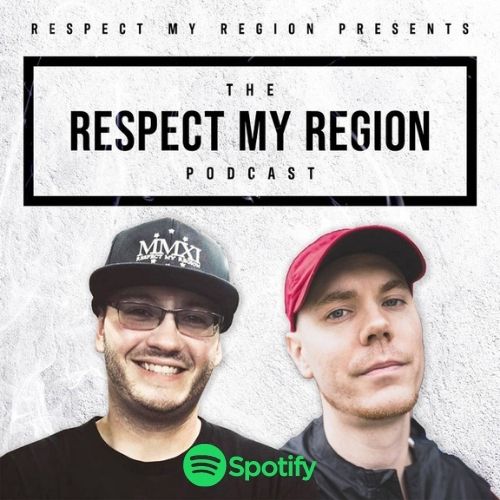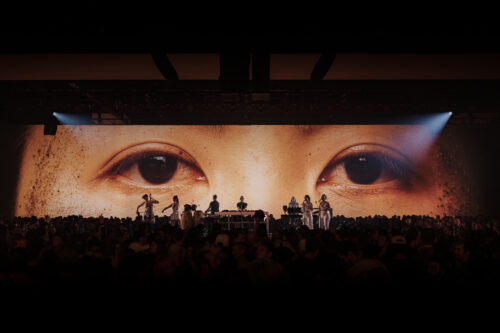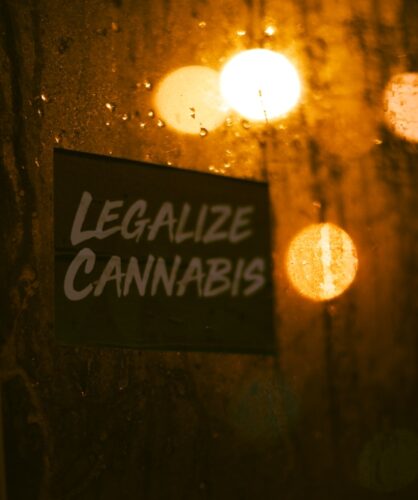Ahead of the Death By Stereo event happening this Sunday at Barboza, I had the opportunity to sit down with producer Rob Reeves to learn about his production, influences, and strategy heading into his headlining beat battle. He will be going up against Bravodomo in the main event in Death By Stereo – which is a battle that cannot be missed.
Death By Stereo will take place Sunday, July 15th at Barboza. Click here for tickets.
Cole: Starting off, I was wondering if you can talk about your music a little bit. Especially for people who aren’t familiar with you, can you talk about where you’re from and how you got into music?
Rob: I was born in a small town in the panhandle of Texas. How I got into music? One day I just felt like making beats to be honest with you. I haven’t done an ounce of music theory or anything, it’s crazy. I think it was my parents low key though, because they always play old school music and I always liked old school. I pretty much have an old soul. I feel like that’s how I want to start because I was listening to all these beats and records that I’ve been hearing on KUBE 93 or any music platform I should say. I wasn’t feeling it, I was just always interested in how they do this. I then went to YouTube and figured out how to download a program FL, and then went to work from there. I started doing tutorials, and it was definitely an experience though because I knew nothing. I was trying to find my sound. I was trying to copy off of other people’s sounds to see what it sounds like. Now I’ve been doing it for at least 8-10 years, and all I’m doing is just building up my catalog. I feel like my sound is special. I don’t know how I got it, it’s just when I play a beat everybody is in awe.
Cole: Can you describe what makes your sound special and how your sound is set apart from producers working in the same style as you?
Rob: I would say it’s more creativity, it’s more feeling than anything. I don’t want it to sound like anybody else so I just scratch out like five beats a day until I get that one. And when I get that one I feel comfortable.
Cole: Can you talk about your process a little bit? Since you make five beats a day and are prolific with your writing, I was wondering how you dive in to making your beats from percussive to lead elements and everything in between.
Rob: First of all, I get in the mood. I have to, that’s the only way. Usually I think about making music and how I want to do it, but now it’s just all instinct. Now if I play a chord or progression and I like it, I’ll just get into it. I usually start off with the melody first and then build my way around it. The meat is the drums; I love drums. If the drums aren’t moving like I want to, I won’t feel it.
Cole: I’m a producer too and one of the things I feel especially with percussion is if you can’t hear the percussion as a stand alone element, it doesn’t have enough of a presence to have the best impact on the track…
Rob: And that’s the thing, not to just say people lack it, but now you hear that it’s lacking that liveness, that bounce. It sounds all monotone, but if you nudge it over just a little bit it creates a swing and its own vibe. And that’s what I really do because I don’t want it to sound computerized.
Cole: So do you incorporate live instrumentation?
Rob: I have including bass. Here pretty soon I’m going to start getting the sax and a real violin. I think that’s what I really wanna do, incorporating more live sounds. I feel like that’s interesting to me.
Cole: One thing I wanted to bring up just because it’s such a huge element is this trap phase in hip-hop. Some people do it really well while some people don’t do it so well, but especially for producers I feel like everyone thinks they can make a trap beat.
Rob: It’s too easy.
Cole: If you have an 808, a hard snare, and a catchy element they can make any type of beat and it sounds factory made. Do you hear that type of thing and turn away from it because you want to make something different?
Rob: Personally, I started in trap. I was looking at YouTube videos with Johnny Juliano, Zaytoven, all those guys. That’s how I really got into it. Their trap beats are crazy. I really mold myself around the big ones like Timbaland and all those guys. It’s more of the vibe and feeling of the beat, I catch on to their beats because it intrigues me. It’s just weird how I process this stuff; I’m pretty much a genius with this music stuff because I really take it seriously. It was more like football; it used to be my thing. It went totally left and I just wanted to focus on music. From doing it 8-10 years you know what you’re looking for and what your sound is. But yeah, trap is too easy. The only way trap will be different is that they have to do something different.
Cole: Can you elaborate on your influences when you first started making music? I know you said your parents got you into music, but was there a certain artist or song that got you into it?
Rob: It was multiple. Young Jeezy, T.I, all the down south rappers because I’m from the South. That’s what I was more into. I can do West Coast because I’m up here, I can do that too. My sound is West Coast and down South, I merged those two together. People just don’t understand it. They don’t understand how it’s possible and how it works. I feel like the down South influenced me as far as the artists down there. I wouldn’t be doing it if it wasn’t for T.I and Young Jeezy. The first CD I bought was a Young Jeezy album. After that I was just studying how they did it for what program they used and just searched on YouTube. And all of a sudden I’m here right now, I’m here.
Cole: Who are some artists currently where you really like what they are doing?
Rob: That’s hard, because there’s not too many that are really live like that. I like old school music rather than new stuff. Obviously Migos, but they’re old to me. They’re just not getting to where they need to be. But I’m mainly R&B, because I’m a laid-back chill guy. I just like that sound of different melodic elements, that’s what I like.
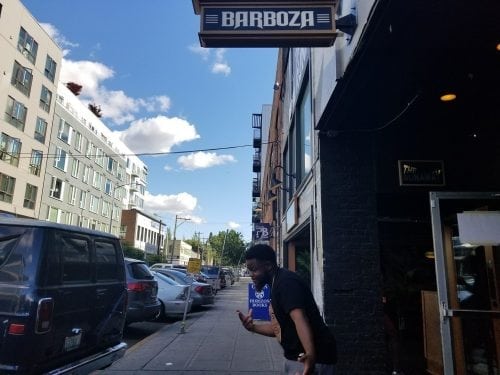
Rob: You know, that’s the only thing about this battle because either way if I win or lose I’m going to be hearing it anyway. I’m gonna hear it. Because I know my capabilities, I know what needs to be done here. I feel like the only way is on the 15th, everybody is just going to have to see. What I will say is there’s a few surprises, there’s a few. But I gotta keep it under wraps. I just want everybody to have a good time to be honest with you.
Cole: I’m interested to learn about the dynamic you have with Brainstorm, because most beat battlers are individual producers who prepare on their own. Seeing Brainstorm’s 10-round battle at the last event, and hearing how he structured all the beats showed how experienced and prepared he was. Can you talk about the dynamic that you both have?
Rob: Let me tell you a little story really quick for how me and him got together. So basically I was in high school and didn’t know anything about Brainstorm, but I had a friend that knew him and lived together with him. And that was my football coach. My coach knew I was making beats and just getting started, because I didn’t show people a lot of my stuff because I wasn’t ready and hyped about it yet. One day I just went over to their house and I played him a few beats. The first couple he was unsure because he hasn’t heard this sound before. Then I played him one song, one beat. And he looked, he turned, and he was already riding. Like he made a song that day. And that was the relationship right there. When that happened, I already knew we were going to be good friends. And knowing that he’s older than me, I’m only 25 he’s older than me. It’s just a chemistry that we have. Because he has a different sound than I do. And that’s a beautiful thing. All we did was mesh it together. Because we have a few beats we made together it’s crazy, I don’t know how we do it.
Personally I don’t know how I make beats, it’s just like I’m in the zone and when it’s done in 10-15 minutes the finished product I’m amazed. It was a weird relationship with him at first, it was weird because I didn’t know how he would portray my music. Because he was already big with Dyme Def and all them guys, and my sound was totally different from theirs. I was unsure if he’d receive it like I do or my parents do. My parents think my stuff was amazing because they saw me hook up in my room or in the studio for hours trying to get one melody down or a right snare. They’ve never seen that before. They saw how dedicated I was. And that’s why I knew he was going to be my friend for a long time because I listen to him. We pretty much just break down our own beats of how we can make them better. And that’s why I feel like our sound is phenomenal.
Cole: I think that says a lot about you as a person knowing that you have your own sound, but at the same time knowing you have things to learn from a person more experienced. You have that humbleness. It seems as though there are a lot of younger artists getting into the game where they feel like they know everything and have nothing to learn. I feel like everyone has to learn from the best to be the best.
Rob: They’re setting themselves up for failure because it can be that one wrong beat and their entire demeanor can change. A random big league person from some type of record label could tell them that a beat isn’t good, and that could crush all their dreams because they always thought their stuff was fire. Instead of realizing it takes more than just talent, it takes everything.
Cole: For example, I played piano since I was three and always competed with performances and things like that. No matter how well I performed and was prepared, there was always somebody better. I think it’s the same for producing, but with much higher stakes while being significantly more competitive compared to some piano competition. Because all producers are competing locally, nationally, and around the world. Unless someone is making at least 100k a year and working with some of the biggest artists in hip-hop, even then, having that willingness to learn is essential to maintaining growth and staying relevant.
Rob: It’s gotta be like that, it has to be. Because it could be that one bad record, and everything is just over with.
Cole: That’s what I love about a platform with Death By Stereo, because if someone plays one bad beat it’s over. It doesn’t matter if someone already played five that were fire. If the audience hears one bad beat or sample it’s done.
Rob: That’s the only thing. They have to come with energy with these beats. They have to, because if they’re lacking people are going to realize that. Because a beat alone gotta move, it has to move something. You can’t just play a beat and have everybody sit still. There’s gotta be more life to it, gotta me more soul into the music. That’s what I go by. If I can’t feel it, or my niece, my mom, or my dad is not bobbing their head to it, then it’s not the one.
Cole: Do you find that you thrive in situations where you know you can’t play a bad beat, or do you feel that it’s reality for all that you do in production that it always has to be hot?
Rob: That’s the reality. Because I feel my name is on something, and I want my name to be powerful. I want to walk around somewhere and have people think “Oh is that Rob Reeves?” or “Oh, he’s dope at making beats”. I feel like I thrive off of that more. Just knowing that my product is phenomenal and knowing that everybody enjoys that. I feel like if I make a beat and somebody enjoys it, I made my day and I made their day. I’m blessed and humble. I mean this beat battle is just another beat battle; I’m just showcasing beats that nobody has heard before. I don’t really care about winning and losing to be honest.
Cole: Do you have anything to tell your competitor prior to the battle on Sunday?
Rob: Sunday is going to be a fun day. Everybody should just get out, get out to that day. I just wanna show everybody what my capabilities are. Hopefully they vibe to it, hopefully. I mean, because I vibe to it.
Cole: It sounds to me it just gets down to the the music and letting it speak for itself.
Rob: That’s it.
** All interview material has been transposed from voice to text. Therefore, the interview has been edited accordingly to show the most accurate transposition **

